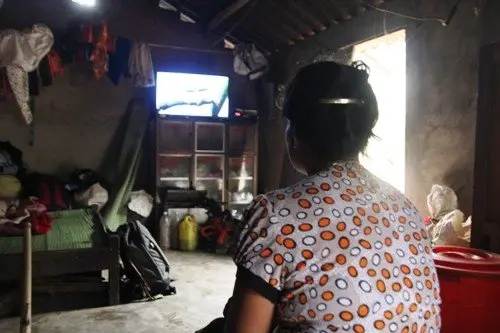By APD writer Alice
Cross-border trafficking of unborn babies has been emerging recently as a new crime in Vietnam as more and more pregnant women in poor mountainous areas are incited to cross the border to sell their babies after they are born.
In Huu Kiem commune, Ky Son district, Nghe An province, the so-called “buying and selling foetus” has been spreading like an infectious disease.
Initially, there were only a few cases in Dinh Son 1 village, then gradually spread to Dinh Son 2, Huoi Tho and now to some other villages. Particularly in Huu Kiem, according to statistics, at least 22 women crossed the border to sell their babies.
Chairman of the communal People's Committee Nguyen Huu Luong said that the unborn baby trafficking is a new type of crime. Women who sold their babies were in difficult situation and had low educational level.
The babies were sold at different prices, but girls were more costly than boys, with prices ranging from 45-80 million VND (1,900-3,400 USD), he said.
Particularly, 2018 was considered an alarming year when pregnant women took turns crossing the border to sell their babies. They implicitly decided the fate of the unborn children.
“They sold their children because of poverty. Some even sold both of their babies,” Luong said.
He added that many mothers lacked motherhood and sold their babies just because they needed money. They blamed for poverty and hunger, but in fact they wanted to change their life, buy motorbikes, and build houses. In addition, the mothers believed in what people who enticed them to sell unborn babies said such as buyers would give their babies a better life and so on.
A 35-year-old woman who declined to give her name said she sold her 4th daughter in early 2018. Previously, her family was miserable, even the food and clothes were not available, but now the roof was replaced, the kitchen was repaired, and there were televisions and motorbikes in the house. When asked about the amount of money to buy these household appliances, the woman did not hesitate to answer: "We sold our child to get the money."
She said poverty forced her to sell her daughter for 80 million VND. In a winter afternoon in March 2018, while sitting in the kitchen, a woman from another village came into her house to ask about her pregnancy. Not hiding the difficulties, the mother talked about her family's situation and her fear of not being able to raise the baby. The visitor did not hesitate to show her a quick way to make money without losing any cost: selling the unborn daughter. “She said the child costed 80 million VND. After crossing the border to deliver the baby, I would take the money,” the mother said.
Without thinking further, she ran into the house to talk with her husband when he was drunk. He nodded immediately. Then two days later, she left her home. It took her two days to reach the destination. Initially, she took a car in Muong Xen township (Ky Son) to Mong Cai (Quang Ninh province). Upon arrival, there were two foreign women waiting there and then took her to a boat crossing the river to the other side of the border.
When she arrived, she was taken to a house in a remote rural area and fully cared for until her delivery. He had to live in a closed room and were not allowed to go out.
One morning, she gave birth to a baby girl. But when she tried to see her daughter, the baby was taken away by a strange person and since then, she has not seen her child anymore.
Two days after giving birth, she received 80 million VND and then was taken home.
The chairman of Huu Kiem commune continued to share that when discovering the cases of foetus trafficking, the district and commune had meetings to find ways to prevent them. Local police and officials in charge closely monitored pregnant women from the first months of their pregnancy to birth. Seeing anyone who show signs that they want to sell their babies, police will come to their home to persuade.
Despite knowing it is immoral, women still continue to sell their unborn babies. That is because of the mothers’ limited awareness and knowledge, difficult living conditions and no thorough sanctions.
Therefore, communication campaigns to raise local people’s awareness are needed to push back the crime, Luong stressed.
He also highlighted difficulties facing competent forces in fighting the crime as there are not any regulations to deal with it.
Many arrested admitted that they colluded with rings to bring women to the other side of the border to sell their babies, but the police can only prosecute them for sending people abroad illegally," Luong said. He explained that women often go to sell their babies when they are in the 7th to 9th month of their pregnancy. At that time, the baby is not yet born and recognised as a Vietnamese citizen so it is very difficult to handle such a case.
"Crossing the border, they do not bring babies but only fetuses, so they cannot be charged with human trafficking," according to Luong. That is also the reason why 22 women in Huu Kiem, despite admiting that they brought their babies to the other side of the border to sell, still live normally as if nothing happened.
At present, the best way is to persuade and supervise women, but it is necessary to name the act of foetus trafficking a crime so that they dare not sell their babies.
“Pregnant women are put under close supervision for 9 months. Many people who used to sell their babies still intend to sell again, but with strict monitoring, they could not do that. We forced them to write a pledge and if they sell their babies, they will go to jail, so they are scared, ”said Van Van Thuan, a police officer in Dinh Son village.
According to statistics, the central province of Nghe An has recorded about 25-27 foetus trading cases. Particularly in 2018, the provincial authorities detected, arrested and prosecuted 16 cases, with 26 people involving in child trafficking; and rescued 40 related victims.
(ASIA PACIFIC DAILY)
 简体中文
简体中文













